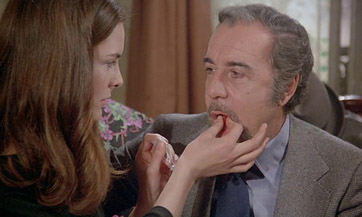|
|
Sole Criterion: That Obscure Object of DesireBy Brett Ballard-BeachJune 7, 2012
Bunuel began 1862’s The Exterminating Angel with the most glorious of epigraphs: “The only explanation for this film, from the standpoint of pure reason, is that there is no explanation.” It bears a striking resemblance to Mark Twain’s ironic rejoinder at the opening of The Adventures of Huckleberry Finn cautioning: “[that] persons attempting to find a motive in this narrative will be prosecuted; persons attempting to find a moral in it will be banished; persons attempting to find a plot in it will be shot.” Love and longing and sexual passion are already surreal and absurd in their nature (since they are enacted by such flawed creatures as we human beings) and Bunuel has no need for explanations as to why Mathieu so instantly becomes smitten with Conchita. In his story/confession on the train, he is still somewhat sheepish and as baffled as his confessional audience is (and we are). Where the mystery rests is in what Conchita truly feels for her (would-be) lover. It may seem as if she is the only one playing games at times, but Mathieu takes the bait time and again and subjects himself to humiliation as often as Conchita seems determined to visit it upon his head. One of the bonus features on the Criterion DVD presents excerpts from a 1928 French production of the source novel, accompanied by translations of the text and indications of the parallel scenes in Bunuel’s film. Aside from the shock of seeing the explicit (for its time) French film, what’s striking is how similar those chosen moments are to the scenarios that Bunuel and Carriere have staged. Bunuel has done a fairly faithful only slightly modernized adaptation of the tale. Examining a few of those alterations, as well as the biggest conceit he makes in the nod of his surrealist past, helps to illuminate some of the larger points he strives to make.
|

|
|
|

|
Friday, November 1, 2024
© 2024 Box Office Prophets, a division of One Of Us, Inc.


